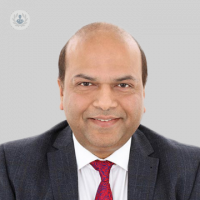Thyroid surgery: Your questions answered
Written by:The thyroid gland, located in the front of the neck, is responsible for the secretion of hormones like the thyroid hormone, that regulate key body functions. When a disease develops in this gland, surgery for its removal may be recommended.
Here, Mr Anurag Jain, esteemed consultant ENT surgeon, provides an expert insight into thyroid surgery. He explains what thyroid surgery involves, how painful is it and how the voice box is protected during the surgery, among other important points.

When is thyroid surgery required?
There are several reasons for having thyroid surgery, which are as under:
- The presence of a large thyroid lump or nodules that causes either pressure symptoms or cosmetic concerns.
- The presence of thyroid lumps, whereby the needle biopsy has raised a concern for thyroid cancer.
- Patients with overactive thyroid cases of thyrotoxicosis who either cannot tolerate, do not wish to take or whose symptoms are not controlled by anti-thyroid medicine.
What does thyroid surgery involve?
Thyroid surgery is undertaken under general anaesthetic and typically requires one or a two night's stay in the hospital.
Surgery may involve either: removing half of the thyroid gland (which usually takes around two to three hours) or removing the whole of the gland (which takes around three to four hours including the anaesthetic and the surgical time).
After the procedure, patients will have a drain coming out of the neck, which typically is removed in the next one to two days.
How painful is it?
Thyroid surgery is not very painful and patients are prescribed adequate analgesia post-operatively to keep them comfortable.
What is included in the aftercare?
If only half of the gland is removed, then typically patients stay overnight and are usually discharged the next day following the removal of the drain.
If the whole gland is removed, then two drains are placed. Usually, they would come out in the next two days, but this duration can vary.
After the removal of the total thyroid gland, patients will need to take a thyroid supplement in the form of a tablet for the rest of their lives. It is likely that they may also require calcium or Vitamin D supplements, either temporarily or (rarely) for life.
How is the voice protected during thyroid surgery?
The nerve supplying the voice box runs very close to the thyroid gland and is potentially at risk of damage during the thyroid surgery. This is prevented by using a nerve monitor to identify and preserve the nerve.
In some occasions, however, the nerve can either be bruised (causing temporary hoarseness) or rarely damaged (causing permanent hoarseness), which can be improved by speech therapy and vocal cord injection. Side effects are rare but may include, bleeding, scarring, infection, the return to the theatre to stop bleeding and seldom, the need for blood transfusion.
If you require thyroid surgery and would like to discuss your options with an expert, don’t hesitate to visit Mr Jain’s Top Doctors profile today.


